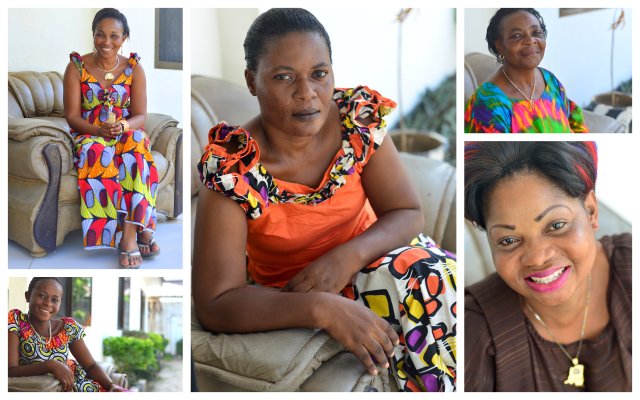Today, my social media feeds are peppered with inspirational quotes about taking risks, overcoming fear and living a meaningful life. As many younger women of my generation, I being true to myself is something I aspire to. Some would argue that living up to this principle is reserved for those privileged enough to have options, supportive families, access to education, and or living in a developed country. Is this really true? Is a life with meaning really reserved only for those who can afford to take the uphill road?
A couple of weeks ago, Reine*, a Congolese refugee woman living in Dar es Salaam, taught me a lesson in courage and resilience -- given the space, those who are often seen as powerless can lead with an inspirational and meaningful life. Surprisingly, given her life experiences, her most recent courageous move had more to do with her choice of attire: wearing her Congolese Kitenge openly in her neighborbood has been her way of "coming out" as a refugee in Tanzania and facing xenophobia head-on.
I met Reine at a focus group during a site visit to the Dar es Salaam office of Asylum Access Tanzania. The horrors Reine endured in Congo are too terrible to describe. When she fled to neighboring Tanzania she had two alternatives: enduring the detention in a refugee camp for an indeterminate period or braving the uncertainty of a large city full of strangers. Each option is a tradeoff: In the camp she receives assistance, but depends aid, feels unsafe and cannot work or move. In the city, she has options, but lives in violation of Tanzania's strict encampment policy: without documents and in the shadows. Despite her fears, she moved to the city. A few years after enduring discrimination, she has chosen to wear her Congolese kitenge openly.
In her context, facing xenophobia with brightly colored patterns of a beautiful three-piece dress is a choice that brings substantial risks. In Dar es Salaam, her survival depends on blending in: "If people learn I am Congolese, I automatically become a target; I will lose my job, my children will be treated different at school, and I can be sent to jail." People know police won't take crimes against Congolese seriously, so people know they can get away with stealing or defrauding them. So most Congolese urban refugees opt for being invisible. With so much on the line, she has no incentives to show her true identity or make public demonstrations of her heritage. "I do it for my children," she said, "so they know to be proud of who they are."
She is not alone. Other women in the focus group said they also slowly starting to "come out" as undocumented refugees in Dar es Salaam. Only a few years ago, urban refugees in Tanzania were an invisible population, barely served by international agencies and insignificant in needs assessment maps. Yet slowly, women are transforming their every day reality by promoting the Congolese Kitenge as a visible expression of changes in the make-up of Dar es Salaam as a city with solidarity. She explains her logic:
Tanzanian people admire the pattern and quality of Congolese kitenges, I even heard the wife of the president encourages people to wear them. It's a sign that if something good can come out of Congo, maybe its people are good too.
I consulted the talented Tanzanian fashion expert Doreen Noni, who agrees: fashion as a form of cultural expression brings out the pride in one's heritage and culture. It is uplifting to see urban refugee women owning it as the symbol of unity and struggle. Closer to the border, the fashion landscape has already transformed to reflect cross-border cultural understanding, as documented in a report about Kigoma: From Kanga to Kitenge.
Movements start in diverse ways. Nothing seems further apart than my friends in Geneva talking of starting a Lean-in Circle and Congolese women helping each other sprice up the crisp sleeves of their kitenge. Yet I venture to take the leap and find commonalities: women, supporting each other through whatever means they find meaningful can go further than each of us alone. This International Women's Day, we may want to see beyond our immediate struggles and find inspiration in the courage of women like Reine as she starts a quiet but powerful expression of being undocumented but unafraid.
*Real name changed to protect the identity of the refugee.

This post is part of a series produced by The Huffington Post and The World Economic Forum in recognition of the latter's Global Shapers initiative. The Global Shapers Community is a worldwide network of city-based hubs developed and led by young entrepreneurs, activists, academics, innovators, disruptors and thought leaders. Aged between 20 and 30, they are exceptional in their achievements and drive to make a positive contribution to their communities. Follow the Global Shapers on Twitter at @globalshapers or nominate a Global Shaper at http://www.globalshapers.org/apply.
